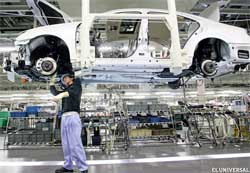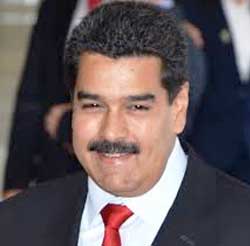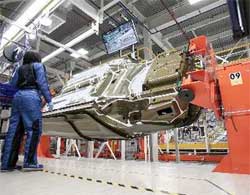Venezuela car industry collapses

Vehicle assembly plants are facing their worst year in the oil-rich OPEC nation, producing five times fewer vehicles than last year because of the lack of imported supplies amid an economic crisis that began last year.
Most economic experts blame the South American country's problems on a decade of rigid currency and price controls, as well rising debt, dependence on imports and stagnant economic growth.
Four of the seven assembly plants - owned by Chrysler, Ford, Iveco and Toyota - have gradually stopped production because of the complex bureaucratic process they need to go through to get dollars and pay for parts.
Venezuela is only providing the US currency at the official rate of 6.3 bolivars to the dollar to importers of designated priority goods producers such as food and medical supply companies.
Others who need dollars to pay overseas bills have to buy them at a higher rate at government-run auctions and many companies have complained that Caracas is not providing them with enough hard currency to pay for critical supplies.
Inflation rate hits almost 60%
The currency controls, in place since 2003, have led to shortages of a wide range of basic necessities, and fuelled inflation to just under 60%.
So far this year, government data shows that the car sector has received less than one percent of foreign exchanges granted to importers, at a time of high inflation, and shortages of food and medicine.

Consequently, car production this year has dropped by 82.6% compared with last year, according to Venezuela's Automotive Chamber. A total of 104,000 units were produced in 2012. Last year that number fell to 72,000 units and, during the first quarter of this year, only 3,990 cars were made.
The industry has been halved in five years. Faced with this crisis, President Nicolas Maduro's government summoned local representatives of Chrysler, Ford, General Motors and Toyota to address their currency settlements, estimated at almost US$2.8bn.
Although the government announced that GM would not close its plants this year, union leaders had previously said that the company's two factories would stop production in May because they had no parts essential for manufacturing cars.
Currency crisis not something new
The crisis in vehicle production and supply is nothing new. Dealerships across the board have almost no units to sell, and many only keep their doors open to provide maintenance services. Customers often have to wait a year to obtain a vehicle.
The middle- and upper-classes have turned to buying cars as a hedge against inflation, currently four times the interest rate on bank deposits.
But as demand exceeds supply, many have to resort to the used car market, where vehicles are more expensive than new ones, as new care prices are controlled by the government.
A new 2014 Mitsubishi Lancer costs 458,000 bolivars ($45,800 at the official rate or US$6,500 on the black market).

A used, 2012 version of the same model costs about 1.3m bolivars (US$130,000 at the official rate and US$18,500 on the black market). A middle-class family needs an average of four years of income to buy a second-hand Mitsubishi.
And such a transaction would involve a pickup truck full of cash in a country where the highest denomination is 100 bolivars, or less than US$1.50 on the black market.
Black market thriving
Some have resorted to bribes. A buyer, requesting anonymity gave an envelope stuffed with 150,000 bolivars to his dealer to speed up the purchase of a new car for 410,000 bolivars.
"I don't regret doing it. Otherwise, I wouldn't have my car," the buyer told AFP.
Workers are especially worried about the huge decline in production.
"We could lose our jobs. We are the ones who are suffering the most," said FUTAAC the car workers trade union chief Christian Pereira.
"There are problems and we're not speaking about them. Agreements are not materialising, there is no date for currency allocations and we don't know when the factories will start up again," Pereira said.
The vehicle assembly sector employs about 11,000 people directly, and 100,000 indirectly, accounting for nearly one percent of private sector jobs.
Source: AFP via I-Net Bridge
Source: I-Net Bridge

For more than two decades, I-Net Bridge has been one of South Africa’s preferred electronic providers of innovative solutions, data of the highest calibre, reliable platforms and excellent supporting systems. Our products include workstations, web applications and data feeds packaged with in-depth news and powerful analytical tools empowering clients to make meaningful decisions.
We pride ourselves on our wide variety of in-house skills, encompassing multiple platforms and applications. These skills enable us to not only function as a first class facility, but also design, implement and support all our client needs at a level that confirms I-Net Bridge a leader in its field.
Go to: http://www.inet.co.za









